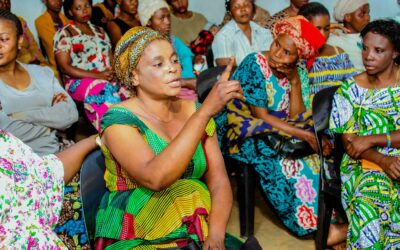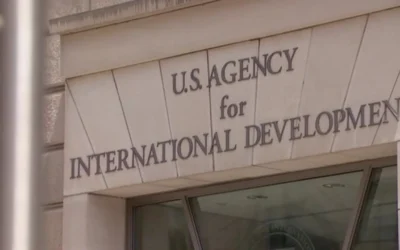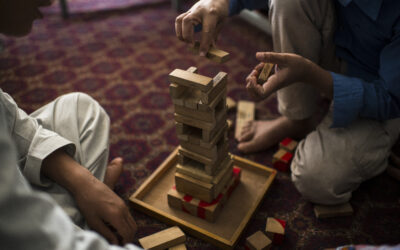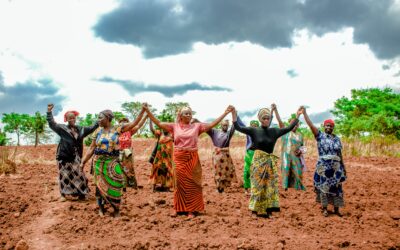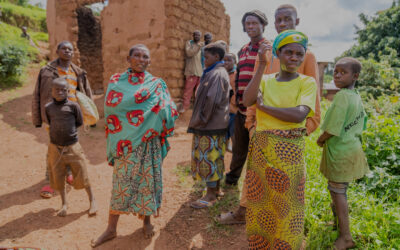Climate Justice is Gender Justice

Marc Romyr Antoine
We’re pleased to introduce you to one of our ODW partners, Marc Romyr Antoine. Marc is the Vice President of International Programs at Tearfund USA, and formerly served as Tearfund’s Country Director for Haiti. Marc is also a Pastor and social justice advocate, currently researching Diaspora Missiology. He is married to Stephanie and they have two toddler boys.
Marc, tell us a little about yourself. How did you become interested in issues of justice and poverty alleviation?
I was born in Haiti, and my family moved to the States when I was a toddler. I grew up in the Haitian community in Philadelphia in the 90s, during a time when Haitians were being blamed for bringing AIDS to the States. My uncles were part of a group that protested, and I learned from them that Haitians have a long history of resistance and justice.
I began to build a Biblical understanding of justice by reading Nehemiah [in the Old Testament]. Nehemiah was a member of the Jewish diaspora growing up in Persia, but decided to go back to his home in Jerusalem to rebuild the city walls after the city was burned down. That’s when I started reading the Bible through the lens of justice, and felt the call to go back to my home country of Haiti.
How have you seen climate change impacting Haitian communities? How are climate change and poverty connected?
From 2000-2019, Haiti was considered one of the top 5 countries in the world impacted by climate change. Over that period, there was a significant increase in the number and severity of climate-related disasters like hurricanes and droughts. There are areas of Haiti that haven’t had rain for 5 years, and other areas with constant severe rain storms. Southern Haiti – which is considered the breadbasket of the country and produced 90% of the nation’s food – is still recovering from Hurricane Matthew.
Farmers who were dependent on rainfall for their food and living have had to migrate to cities, but there often aren’t jobs available for them there. Loss of livelihoods due to climate change has led to more food insecurity. 70% of Haitians are now food insecure.
There’s a lot of research happening on the connections between climate change and gender inequality. In much of the world, women are the ones responsible for collecting water and firewood, and providing food for the family. In Haiti, how is climate change disproportionately impacting girls and women?
Traditionally in Haiti, a majority of farmers are men. If they can no longer produce food, then women bear the financial impact since they are the ones who do commerce and sell produce. Young women may seek other ways of earning money that are less dignifying.
Women and children are the ones more likely to be home during natural disasters, leaving women in the difficult position of trying to protect the little ones. Climate change has also led to longer periods of drought and rivers drying up, which means women have to walk even further to gather water. All of these circumstances leave women in vulnerable positions.
This year One Day’s Wages is partnering with Tearfund USA to empower Haitian women farmers through climate adaptation and gender equity training. What are you hopeful for in this project?
I have hope in people’s resilience. A lot of families in Haiti live day to day. They wake up in the morning, have their coffee, and literally don’t know how they will get food for the day. But Haitians are innovative: they can take something small and make it stretch a long way. The project will offer resources like agroforestry seedlings that have a long-term impact on farmers. These resources provide a safety net that enable people to look to the future.
More stories of impact
Turning Challenges into Opportunities: Masoka’s Journey of Empowerment
Masoka’s hands are stained with the rich soil of the land she now calls home. A 37-year-old mother of four, she arrived at Dzaleka Refugee Camp in Malawi after fleeing the conflict in her home country, the Democratic Republic of the Congo. The future felt uncertain,...
What Was USAID, and What Now?
USAID has made news headlines constantly over the last few months. You may find yourself wondering: what is USAID, and is One Day’s Wages affected by its dismantling? As a global development organization, we at ODW care deeply about the people who depend on foreign...
Growing Love, One Drop at a Time: How One Woman Turned Her Birthday into a Gift of Clean Water
When Sara, a graphic designer and mother from Oregon, started thinking about how to celebrate her birthday, she decided to do something different—something meaningful. With a belief that “we are all connected… with the power to affect change by how we live our own...
Bridging the Gap: An Update on Our Response to the Funding Freeze
In Matoh, Cameroon, a mother prepares to give birth. Life in a conflict zone means getting to a safe facility with trained health workers is nearly impossible. Fortunately, a new mobile clinic begins offering prenatal care and transportation to a birthing clinic,...
Why We Invest in Women
There’s an old Ghanaian proverb: “If you educate a man, you educate an individual. But if you educate a woman, you educate a family.” On this International Women’s Day, we celebrate the power of women—how their resilience, leadership, and determination transform not...
The Case for Social Inclusion
Today is the World Day of Social Justice! Never heard of it? Never fear, we’re here to fill you in. In 2009, the United Nations General Assembly launched the World Day of Social Justice to recognize our on-going need for inclusive economic development and decent work...
LEARN
Leadership
Transparency
Read the Latest
Contact Us
COLLABORATE
Faith Groups
Schools
Businesses
Get Involved
One Day’s Wages exists to alleviate extreme poverty by investing in, amplifying, and coming alongside locally led organizations in underserved communities.
©2025 One Day's Wages is a registered 501(c)(3) organization | Tax ID #26-2566653 | Privacy policy | Terms of use
P.O. BOX 17575 Seattle, WA 98127 | Contact us

